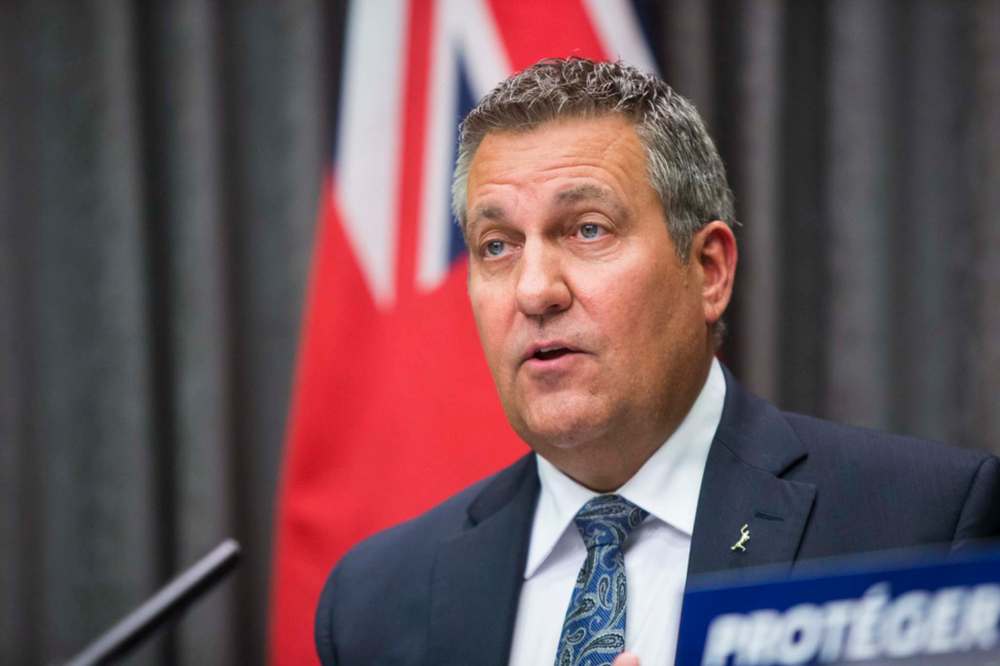Minister takes questions on proposed councils
Advertisement
Read this article for free:
or
Already have an account? Log in here »
To continue reading, please subscribe:
Monthly Digital Subscription
$1 per week for 24 weeks*
- Enjoy unlimited reading on winnipegfreepress.com
- Read the E-Edition, our digital replica newspaper
- Access News Break, our award-winning app
- Play interactive puzzles
*Billed as $4 plus GST every four weeks. Offer only available to new and qualified returning subscribers. Cancel any time.
Read unlimited articles for free today:
or
Already have an account? Log in here »
Hey there, time traveller!
This article was published 28/05/2021 (1376 days ago), so information in it may no longer be current.
Provincial officials were pressed on how they expect parents to have either the expertise or time required to volunteer on new school councils, during a town hall on the Tory government’s proposal to overhaul the public education system.
For an hour Thursday, Education Minister Cliff Cullen, deputy minister Dana Rudy, and Scott Johnston, a former school trustee and current MLA for Assiniboia, who was chosen to lead Manitoba’s parent engagement task force, fielded questions.
The evening event — the first of four telephone town halls that are scheduled for families in different regions of the province over the coming weeks — drew caregivers from Winnipeg with queries about the Education Modernization Act (Bill 64) and related strategy.

The legislation aims to replace English school boards with a centralized authority made up of government appointees. Following the reforms, there will be 15 regional directors who correspond directly with local school leaders and parent-run councils in their areas.
A parent engagement officer will liaise with parents and support each school community council, which will have the power to advise principals on everything from teacher hires to student outcomes, capital construction proposals to school budgets.
“The parent engagement officer will be positioned within the schools or the regions and those could be people like teachers, social workers, community connectors — people that have skills in the area of engagement and helping people to facilitate (parent) involvement,” said Rudy, in response to a question about how the councils will function.
Such officers might do work to assist and engage newcomer parents or other caregivers who have little experience with councils, she added.
Answering a similar query about how busy parents will make time to volunteer, Johnston responded that the officers will help orient parents and allow them to “maximize their time commitments.”
Callers expressed a mix of support for change and concerns about the legislation and strategy during the hour-long call.
A single caller was cut-off half-way through a sentence as she expressed frustration about how the province plans to fund education without the special tax levy, and both convince and train volunteer parents to get involved in the new councils. “I’m livid about all of this. It’s like you’re saying the right things, but there’s absolutely nothing behind it,” said the caller, before the line was disconnected.
Cullen explained the province has pledged to take on “more of the load” in education funding to lessen the burden on individual homeowners.
Later on, Rudy told a caller curious about evidence behind their plan that much research shows parent engagement has a positive effect on everything from student learning to graduation rates.
Karen Myshkowsky, a Winnipeg educator and mother of two students, said she hung up on the town hall 45 minutes into it because of her frustration with the “canned responses.”
“Here we are, remote teaching and just trying to survive and keep kids engaged and they are barrelling ahead with this,” said Myshkowsky. “It’s really surreal.”
She added that she still has little idea about how working parents with busy lives will be able to take part in these councils.
During the call, Rudy indicated two or more schools will be able to collaborate through a single parent council representing them if they have difficulty recruiting enough members. The deputy education minister also suggested the task force is looking into ways — such as providing child care — to ensure all parents have an opportunity to participate.
Manitoba’s lagging international test scores, the introduction of new standardized tests and report card tweaks, child poverty, potential savings with the new model, and the removal of principals from the teachers union were also discussed during the hour-long event.
“Thank you for joining us on this journey — quite frankly, it is a journey. We are attempting to be the most improved province in the country,” Cullen said, during his closing remarks.
“Big challenges ahead of us for sure, but I know Manitobans will join us on that journey.”
maggie.macintosh@freepress.mb.ca
Twitter: @macintoshmaggie

Maggie Macintosh
Reporter
Maggie Macintosh reports on education for the Winnipeg Free Press. Funding for the Free Press education reporter comes from the Government of Canada through the Local Journalism Initiative.
Our newsroom depends on a growing audience of readers to power our journalism. If you are not a paid reader, please consider becoming a subscriber.
Our newsroom depends on its audience of readers to power our journalism. Thank you for your support.



